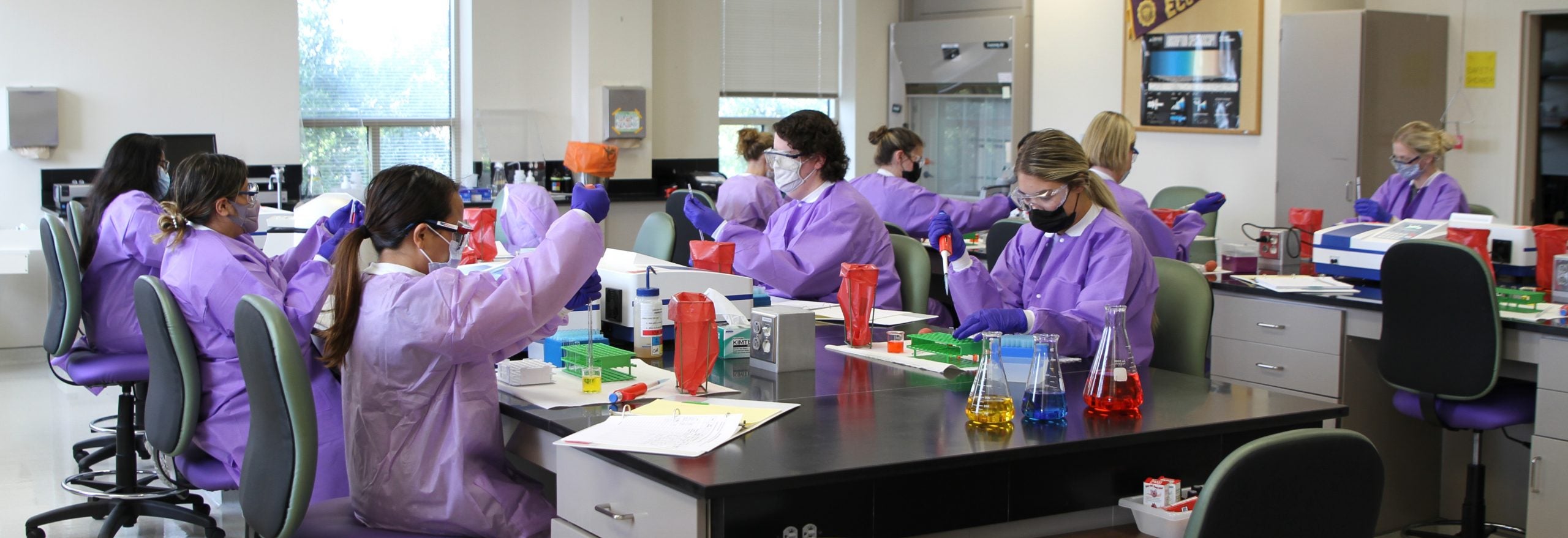About CLS
About the Department of Clinical Laboratory Science
The Profession
Medical laboratory scientists (also known as clinical laboratory scientists or medical technologists) provide diagnostic test results that directly impact patient care.
Professional Duties Include:
- Identifying normal and abnormal blood cells
- Culturing and identifying microbial pathogens
- Processing blood products for transfusion
- Performing biochemical tests for metabolic diseases
- Interpreting laboratory test results
- Operating laboratory instrumentation
- Ensuring test accuracy through quality control/quality assurance practices
- Advancing to supervisory or managerial positions with experience
Consider This Profession if You:
- Love science, especially hands-on activities
- Are passionate about helping others
- Enjoy engaging with new technologies
Employment Outlook
- Job growth for medical laboratory personnel is projected at 5% over the next ten years according to the Bureau of Labor Statistics
- Hospitals report current vacancy rates from 7 – 18% in their laboratory sections; expected retirement rates over the next five years range from 9 – 20% (2022 ASCP Vacancy Survey)
- The national average hourly wage for Medical Laboratory Scientists is $33.13 (2022 ASCP Wage Survey); wages vary by geographic location, worksite, size of facility, education, certification, and experience
The Program
Program Outcomes
100% (2023-2024)
no data (2022-2023)**
100% (2021-2022)
100% (2020-2021)
100% (2019-2020)
60% (2023-2024)***
no data (2022-2023)
78% (2021-2022)
70% (2020-2021)
91% (2019-2020)
100% (2023-2024)
no data (2022-2023)
100% (2021-2022)
100% (2020-2021)
100% (2019-2020)
*within six months of graduation for students seeking employment
**No students graduated during this timeframe due to a COVID-19 related admissions pause.
***N=5
Degree Options and Professional Certification
- Students who complete the program earn the Bachelor of Science (BS) in Clinical Laboratory Science
- Double Major/Dual Degree options exist for students who wish to earn degrees in both Clinical Laboratory Science and Biology, including
- BA-Biology and BS-Clinical Laboratory Science
- BS-Molecular/Cell Biology and BS-Clinical Laboratory Science
- Students who complete the BS in Clinical Laboratory Science are eligible to take nationally-recognized certification examinations
- Medical Laboratory Scientist (MLS) credential – offered by American Society for Clinical Pathology (ASCP)
- Medical Laboratory Scientist (MLS) credential – offered by American Medical Technologists (AMT)
Pre-Professional Enrollment Requirements
- Successful completion of ECU’s foundation courses
- Courses in general chemistry and organic/biochemistry
- Courses in general biology, microbiology, and anatomy/physiology
- A course in statistics
Professional Program Format
- The professional program is four semesters in length, starting in spring and including summer term coursework.
- The first three semesters in the professional program include on-campus lecture and laboratory courses:
- Hematology
- Immunology
- Immunohematology
- Professional Practice Issues (research, education, management)
- Clinical Chemistry
- Microbiology
- Molecular Diagnostics
- The final semester includes clinical rotations at area hospital laboratories (4 days/week) and on-campus coursework (1 day/week). On-campus courses include a second semester of Molecular Diagnostics and Professional Practice Issues.
Educational Facilities
Program Accreditation
The program is accredited by the National Accrediting Agency for Clinical Laboratory Sciences (NAACLS), 5600 N. River Rd, Suite 720, Rosemont IL 60018-5119
Mission Statement
The mission of the Clinical Laboratory Science department is to prepare individuals to provide quality clinical laboratory services through an educational program that balances medical laboratory theory with clinical laboratory practice.
This mission is supported by the overall vision of the College of Allied Health Sciences which seeks “to make a difference in the health of the region, state, and nation.” (CAH, Accessed 9/21/2017)
The College’s mission is supported by the University’s mission of providing public service and regional transformation through student success, which specifically addresses the areas of healthcare, wellness, and reduction of health disparities. (Chancellor/University-Mission, Accessed 9/21/2017)
for Enrolled and Prospective Students
The ECU CLS degree program satisfies the eligibility requirements for two nationally-accepted certification examinations (the ASCP MLS credential and the AMT MT credential). In North Carolina, certification is highly encouraged and may be required by some employers. Approximately eleven states within the US (as well as Puerto Rico) require a state license to legally practice as a Medical Laboratory Scientist. Some states’ licensure requirements exceed the ECU CLS program’s requirements. If you plan to work outside of North Carolina upon graduation, please explore the licensure requirements of the state in which you wish to work prior to enrolling.
